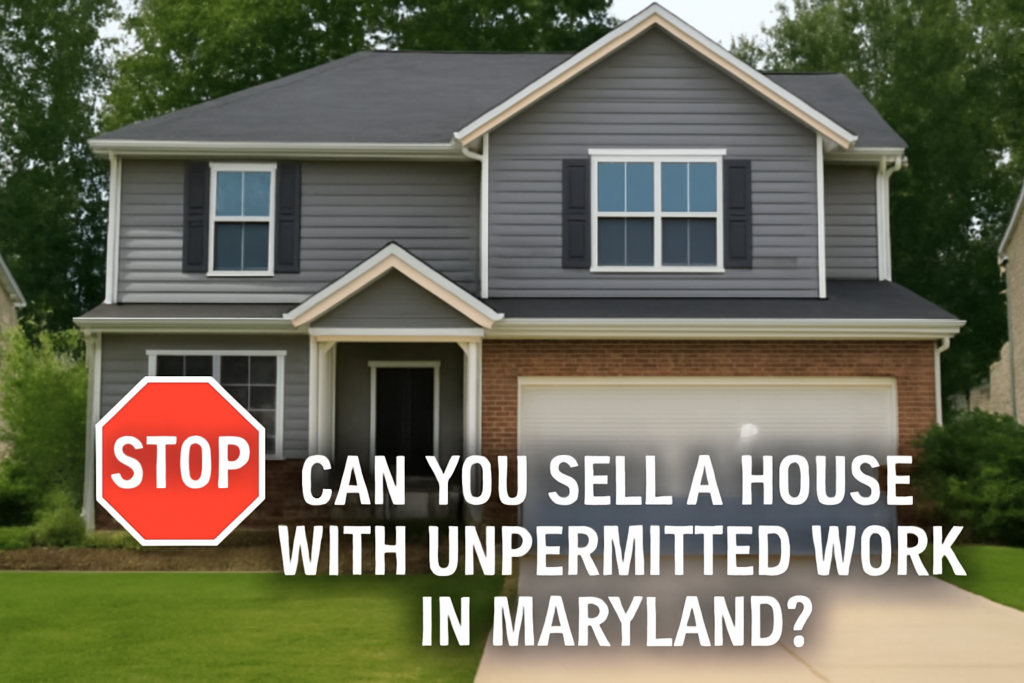Can You Sell a House With Unpermitted Work in Maryland?

Introduction
You’re likely facing a situation where you’ve made changes or improvements to your property without getting the necessary permits, and now you’re wondering whether this is going to be an issue when trying to sell your home. You’re searching for answers to a question that could potentially affect the sale of your property—“Can I sell a house with unpermitted work in Maryland?” The key concerns you likely have are whether unpermitted work will devalue your home, complicate the selling process, or even prevent you from successfully closing the sale. You may also be considering whether it’s worth the hassle and cost to go through the process of getting permits or fixing any issues that could come up during inspections.
In this blog, I’ll address your key concerns and explain the potential risks of selling a house with unpermitted work. I’ll also provide you with a clear understanding of your options, including how selling to a cash buyer can often be a quicker, less stressful solution. If you’re weighing the pros and cons of fixing the unpermitted work versus selling as-is, I’ll give you a detailed analysis of what might make the most sense in your specific situation. Let’s dive in.
What Is Unpermitted Work and Why Does It Matter in Maryland?
Unpermitted work refers to any construction or renovation on a property that was done without obtaining the necessary permits from local authorities. In Maryland, like in many states, certain renovations and improvements require permits to ensure that the work complies with building codes and safety regulations. These may include structural changes, electrical or plumbing work, or even additions like new rooms or decks. When these projects are done without proper approval, they are considered “unpermitted.”
So why does this matter when you’re selling your house? Unpermitted work can significantly impact your sale. Buyers are generally cautious about properties with unpermitted work because they could be taking on the risk of non-compliance with local laws, which may lead to fines, costly repairs, or even having to undo the work entirely. Additionally, many lenders will not approve a mortgage on a home with unpermitted work, which could drastically limit the pool of potential buyers.
This is where the dilemma often begins for homeowners. You might be unsure whether to fix the unpermitted work and apply for the necessary permits, or if it’s better to sell the house as-is, without addressing the issues. Understanding the potential risks and benefits of both options is crucial.
Can You Sell a House with Unpermitted Work in Maryland?
The short answer is yes, you can sell a house with unpermitted work in Maryland, but it can be much more complicated than selling a house that’s fully compliant with all regulations. The issue arises when buyers or inspectors discover the unpermitted work during the inspection process. This can cause delays or even prevent the sale from going through if buyers are unwilling to take on the risks associated with the unpermitted work.
In many cases, buyers may ask you to address the unpermitted work before closing, which can delay the process and lead to additional costs. Alternatively, some buyers may try to negotiate a lower price to compensate for the perceived risk of unpermitted work. However, not all buyers are willing to go down this path, which is where cash buyers come in as a viable option.
If you’re wondering how to sell your house for cash with unpermitted work, the good news is that cash buyers are often more flexible when it comes to unpermitted work. These buyers are typically investors who purchase properties in any condition and are not concerned with the lack of permits. This means that you could sell your home quickly and without the need to make costly repairs or obtain permits, which can be a huge relief if you’re looking to sell your house quickly and move on.
If you’re interested in exploring how to sell your house for cash with unpermitted work, you can read more in our guide on How to Sell a House for Cash with Unpermitted Work.
The Risks of Selling a House with Unpermitted Work in Maryland
While it’s certainly possible to sell a house with unpermitted work, doing so comes with some serious risks that every seller should understand. These risks include:
1. Buyers May Back Out or Request Price Reductions
The presence of unpermitted work can scare off potential buyers or lead them to ask for significant price reductions. Buyers may be concerned about the long-term safety and legality of the unpermitted work, and some lenders may not approve loans for homes with unpermitted work, which could reduce the pool of potential buyers. If you’re relying on traditional buyers, this could be a major issue.
2. Cost of Fixing Unpermitted Work
If you do decide to fix the unpermitted work, you may have to pay for permits and inspections. In some cases, you may also be required to bring the work up to current building codes, which can be a costly and time-consuming process. For example, correcting electrical work or structural changes may involve hiring professionals and paying for new materials, which can cost thousands of dollars. Even if you plan to handle repairs yourself, the costs involved can be significant.
Check out HomeAdvisor for more insight on the costs of home renovations and repairs.
3. Legal Issues
In some cases, local authorities may discover unpermitted work during the sale process, which could lead to fines or orders to undo the work. If the unpermitted work violates zoning laws or building codes, you could face penalties. This could delay your sale or result in costly legal fees.
If you’re concerned about the potential risks and challenges of selling a house with unpermitted work, you may want to read more about the options you have in our detailed post on Fixing vs. Selling a House for Cash With Unpermitted Work.
Fixing Unpermitted Work vs. Selling a House for Cash in Maryland
When faced with the option of fixing unpermitted work or selling the house as-is, it’s important to weigh the costs and benefits of each approach.
Fixing Unpermitted Work:
- Pros: By obtaining the proper permits and bringing the work up to code, you may increase the value of your home and make it more appealing to a broader range of buyers.
- Cons: Fixing unpermitted work can be time-consuming and expensive. In addition to the direct costs of permits, inspections, and repairs, you may also face delays in the selling process.
Selling for Cash:
- Pros: Selling to a cash buyer is a fast and hassle-free option. Cash buyers are often willing to purchase homes with unpermitted work, and they don’t require repairs or permits. This can be especially beneficial if you need to sell your home quickly.
- Cons: While selling for cash can be a quicker process, cash buyers may offer less than the market value for your home, as they are factoring in the costs of repairs and the unpermitted work.
In some cases, selling to a cash buyer might be the best option if you want to avoid the hassle and expense of fixing the unpermitted work.
How Unpermitted Work Affects the Sale Process in Maryland
When you’re selling a house with unpermitted work, the sale process can become more complicated than a typical real estate transaction. In Maryland, real estate transactions are often contingent on various inspections, including those for structural integrity, electrical systems, and plumbing. When a home has unpermitted work, it is likely to show up during these inspections, especially if the renovations or changes affect major systems of the home.
This can lead to one of two outcomes:
- Delays in Closing: Once the unpermitted work is discovered, the buyer may want to renegotiate terms, or they may ask you to take care of the issues before proceeding. This can delay closing and create a sense of uncertainty. As a result, the timeline for your sale could be extended for weeks or even months.
- Potentially Preventing the Sale: In the worst-case scenario, if the buyer is not willing to take on the risk of dealing with unpermitted work, they may cancel the contract altogether. This could leave you back at square one, forcing you to either fix the issues or accept a lower offer from a buyer who’s comfortable purchasing a home with unpermitted work.
It’s also important to note that buyers with traditional financing (such as FHA loans or VA loans) may be unable to close on a home with unpermitted work, as their lender will require the home to meet specific safety and code standards. This can severely limit your potential buyer pool and make it difficult to find someone willing to proceed with the purchase. This is why many homeowners facing these challenges turn to cash buyers, as they typically don’t require inspections and are less concerned with permits or compliance issues.
What to Do If You Discover Unpermitted Work After Purchasing a Home
If you’re a homeowner who has already purchased a home with unpermitted work—whether you realized it or not—this can present a set of challenges. Unpermitted work often doesn’t come to light until an inspection or renovation project reveals that the home doesn’t comply with local codes. The good news is that you have options for how to handle this situation, even if you’re not planning to sell immediately.
- Correcting the Issue: One route is to address the unpermitted work by applying for permits and getting the work inspected by local authorities. Depending on the type of work that was done, you might need to bring the work up to code, which could involve paying for additional repairs or upgrades. However, keep in mind that this process can be costly and time-consuming. Also, certain unpermitted work may need to be completely torn out and re-done if it doesn’t meet current building codes.
- Selling the Property Later: If you’re planning to sell the property in the future and the unpermitted work hasn’t been addressed, you may find that the buyer will face similar challenges. Even if you fix the issue now, there may be paperwork or inspections required to verify that the work was done correctly. In these situations, some homeowners opt to sell to cash buyers to avoid the extensive work and potential roadblocks that can arise with traditional buyers.
In both scenarios, it’s essential to understand your options thoroughly and weigh the costs and benefits of each. If you’re facing difficulties due to unpermitted work, selling for cash might be a simpler, faster way out.
Conclusion: Why Selling to Local Home Buyer Could Be Your Best Option
Selling a house with unpermitted work in Maryland is possible, but it comes with challenges. Potential buyers may back out, demand lower prices, or require costly repairs and permits, which can add stress and delays to the process. If you’re looking for a quicker, hassle-free solution, selling to Local Home Buyer may be the best option for you.
At Local Home Buyer, we specialize in buying homes in any condition, including those with unpermitted work. You don’t need to worry about fixing anything or dealing with permits—we’ll purchase your property as-is, saving you time and money. Our process is straightforward and fast, allowing you to sell your home quickly without the usual complications of the traditional selling process.
If you’re in Maryland and need to sell your house with unpermitted work, reach out to Local Home Buyer today. We provide fair, no-obligation cash offers and can close on your timeline, making the entire experience stress-free. Contact us now to get started and move on with peace of mind.
